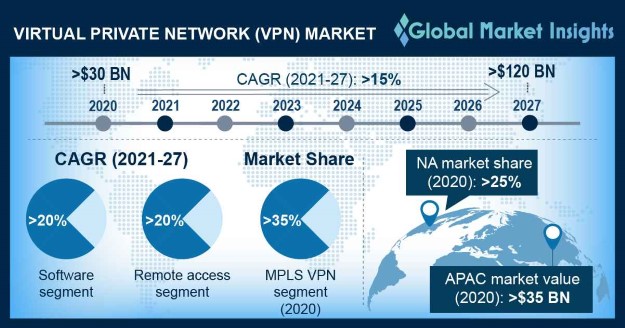Are VPNs Fast Enough, And Secure Enough Or Is There A Better Option?
Virtual private networks are for many people a vital part of staying safe when surfing the net. Firewalls, VPNs, password managers, and malware protection, are only a few of the security measures that are commonly used today for online security.
VPNs themselves are highly popular, with around 142 million people using them in the US alone. Around 30% of internet users say they use a VPN daily for their browsing and online activity.
The global VPN market was worth $30 billion in 2020, and remote working and lockdowns helped to increase VPN usage by 27.1% that year alone. The VPN industry is now predicted to be worth in the region of $120 billion by 2027.
But, are they all good enough for their purpose, or should you be looking at other options?
How effective are VPNs at what they are designed for?
VPNs are used on computers and mobile devices for increased anonymity, and extra security. They offer some peace of mind when signing into banking online, or making any other financial transaction.
Typically, users of VPNs may conduct the following activities online:
- Banking
- Gaming
- Streaming
- Ecommerce
- Paying bills
- General browsing
One of the essential features of an ecommerce site is security, and a VPN adds an extra layer of this when a consumer makes a digital purchase. VPNs can also be used for fun activities such as streaming foreign content or playing games on alternative servers.
How effective a VPN is for these activities is largely down to the developer behind them. There are numerous free VPNs, and some very well-respected paid-for versions too.
The downside to many VPNs is the speed that they run at. Encryption slows down the transfer of data, and to gamers for one, this is not acceptable.
Is there a better option for anonymity and speed?
Another alternative to VPNs is to use a proxy. These are often used by businesses that are involved in scraping websites for data, as users can hide behind genuine IP addresses instead of one provided by the VPN. Many websites can recognize the IPs used by VPNs.
The benefits of a proxy are that they are faster than VPNs and less detectable depending on the type used. However, a proxy service may log all the activity of their users, whereas most VPNs have a no-log policy.
Another option is to stick with a VPN for protection, but use a faster one. A VPN with WireGuard protocol may be the answer as it promises increased speeds, but with security too.
What is WireGuard protocol?
When browsing the technical specs of any VPN you will see a protocol listed. The common protocols that you should see in any VPN details will be these below:
- WireGuard
- IKEv2/IPsec
- OpenVPN
- L2TP/IPsec
- SoftEther
- SSTP
- PPTP
The last two should be avoided, and any VPN that advertises these protocols should be shunned due to some serious security weaknesses. PPTP security flaws were discovered by security guru Bruce Schneier. Open VPN is often cited as being the standard that all protocols should match for security, but WireGuard is now being included in many popular VPNs.
The reason for this is that it promises to replicate the speed provided by some of the earlier VPNs. These apps were less secure than today, but WireGuard’s developers claim this VPN has increased levels of security.
How can you get a faster and more secure VPN?
WireGuard appears to be an option for anyone who requires a faster experience online with a VPN. Developers are always looking at ways to increase the speed of a website, and users also want loading times to be faster. But, security is a concern too, and this can end with something of a trade-off.
Free VPNs tend to be slow, and there is the possibility that security could be less than that of a paid-for app. Some free VPNs may also record your browsing history which takes away the anonymity you may be seeking.
To get a fast, secure VPN you will likely have to take out a subscription. This will ensure that you have one of the best protocols in place, a no-log policy, and high-speed servers in place to send and receive data.
The best way to find the right VPN for you is to use comparisons on the net, read reviews, and search for the best VPNs that offer free trials. Many even allow up to 30 days free for testing.
Summary
VPNs should be an integral part of every home computer user’s security setup. While they can occasionally cause conflict with certain websites, their advantages far outweigh any issues that may sometimes occur.
A good VPN will balance speed and security for an enjoyable online experience, and with the best encryption protocols in place, you can have peace of mind that your sensitive information is safe, and your activity is not being monitored by anyone.



